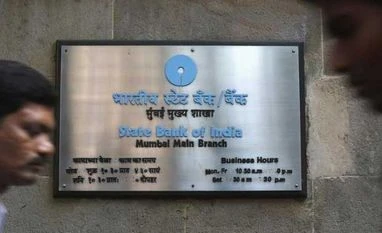Shareholders cry foul as SBI skips e-voting
Bank takes cover under 1955 SBI Act, which does not recognise such modern tools
)
Please read SBI clarifies: E-voting needs change in law at the end of this article, which includes State Bank of India's response.
Shareholders of the State Bank of India (SBI) are crying foul over the bank's refusal to provide electronic voting (e-voting) facilities for its upcoming extraordinary general meeting (EGM).
The country's top bank has issued notices for a shareholders' meeting in February to approve fresh capital-raising plans of up to Rs 15,000 crore. However, the notice is silent about e-voting, which has been made mandatory by the Securities and Exchange Board of India (Sebi).
Also Read
| E-VOTING LAPSES UNDER SEBI LENS |
|
Shareholders argued that being a listed entity, it was obligatory for SBI to provide this facility for all shareholder resolutions. By not providing the facility, the bank was blatantly violating the law and going against the spirit of corporate governance, the shareholders said in letters addressed to Sebi and the exchanges. SBI is quoting provisions of regulations under a six-decade old law to defend its actions.
Regulation 44 of Sebi (Listing Obligation & Disclosure Requirements), Regulations 2015 (LoDR Regulations) provides that, "The listed entity shall provide the facility of remote e-voting to its shareholders, in respect of all shareholders' resolutions. The e-voting facility to be provided to shareholders in terms of sub-regulation (1) shall be provided in compliance with the conditions specified under the Companies (Management and Administration) Rules, 2014, or amendments made thereto."
The provisions are part of the regulator's effort to improve shareholder participation in company decisions to improve corporate governance. As of December 31, SBI had a shareholder base of 1.5 million.
Typically, its general meetings have very poor attendance with not more than few hundred shareholders participating.
In a letter sent to the Sebi chairman, exchange officials and the bank, S N Viswanathan, a Mumbai-based SBI shareholder, said the bank should provide the e-voting facility or explain under which provision of the listing regulations it was exempt. He added the practice was contradictory to the bank's stated corporate governance policy.
Viswanathan also asked both the exchanges to take action against the lapse. He asked Sebi if any special exemption had been given to the state-run bank. The Sebi spokesperson did not offer any comment on the issue.
In response to an email seeking comments, an SBI spokesperson said providing the facility was not feasible given the legal position. "Holding of a general meeting of shareholders and voting is governed by SBI Act, 1955, and SBI General Regulations," he said.
"In terms of the Regulation 31(2) of SBI General Regulations for voting, the shareholder has to be present at the venue of the general meeting or by proxy or through an authorised representative, in case of a company. Hence, providing e-voting facility is not feasible at present," the spokesperson added.
Compliance experts are not convinced. "To claim that the SBI Act does not provide for e-voting is preposterous. It is a 60-year-old law. E-voting came into being in 2014," said S N Anantha Subramanian, former president of the Institute of Company Secretaries of India.
Sebi first introduced e-voting requirements under clause 35 B of the Listing Agreement in 2014. Even then, SBI was among the violators of the provision. According to people familiar with the matter, the bank had then argued it was not a company under the Companies Act and therefore, could not be required to follow procedures under rules framed in the Act.
However, the listing agreement provisions have now been strengthened in the form of LoDR Regulations, which have come into force from December 1. These regulations use the word 'listed entity', which has a broader meaning and encompasses structures that are not registered under the Companies Act too, say governance professionals.
Subramanian, who is also an adviser to public sector banks, pointed out other state-owned banks were also not registered under the Companies Act but had complied ever since the e-voting requirements came into being in 2014.
SBI clarifies: E-voting needs change in law
The State Bank of India (SBI) has clarified it is unable to provide e-voting for shareholders due to the legal position and not because of its unwillingness to utilise such modern tools.
In response to the above article, the bank has reiterated that it cannot provide e-voting unless the SBI Act, 1955 is modified by Parliament.
“It is not that the bank does not want to utilize modern tools like e-voting. E-voting is not acceptable as per SBI Act, which requires shareholders to be either physically present or represented as per the laws. The bank cannot change this procedure unless the Act is modified by Parliament,” it said in an emailed statement on Thursday.
Expressing unhappiness over the shareholders’ perception of the bank's investor unfriendliness mentioned in the report, the bank said: “We deeply resent the attempt made to unnecessarily portray us as investor-unfriendly when the truth of the matter is that we need to be guided by current laws rather than our wishes in any matter.”
On the poor attendance of its general meetings, the bank said, “We would like to point out that the bank has taken all required steps to communicate the details of the AGM / EGM to all its shareholders and should not be blamed for attendance numbers.”
"SBI is a government-owned entity and we believe in following the path of transparency as well as adhering to corporate governance and the regulatory requirements, while dealing with all our stakeholders", the bank added.
More From This Section
Don't miss the most important news and views of the day. Get them on our Telegram channel
First Published: Jan 28 2016 | 12:58 AM IST


